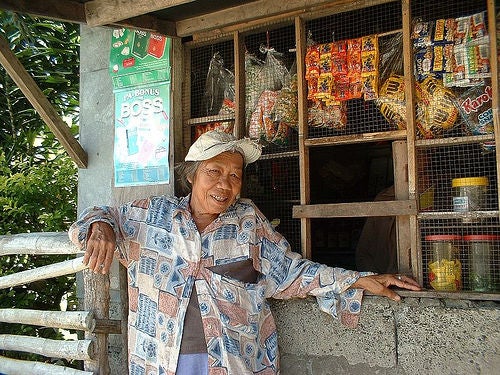Empowering women entrepreneurs is good for development and business. Tune in to World Bank Live on October 11, 2012 10:30 a.m JST. to hear Liberia President Ellen Johnson-Sirleaf and World Bank Group President Jim Kim talk #womenbiz at this year's Annual Meetings.
I’m in Tokyo. The changing colours of the autumn leaves, which would normally preoccupy the nation and its visitors, have been replaced – well, in Tokyo anyway – by fluttering street banners announcing the fact that the city is hosting the 2012 IMF/World Bank Group Annual Meetings. There’s a throng of people – 20,000 is the number bandied about – representing government and private sector delegations from around the world, and they are all here to discuss the status of international economic and financial developments for inclusive growth.
As Director, Women’s Markets, Westpac Group and because of our leadership as a corporation and a country in promoting women’s access to finance, I’ve been invited by the IFC, a member of the World Bank Group, to attend a number of events focused on women in the private sector.
In many developing economies, between 30 and 40 percent of the entrepreneurs running small or medium sized businesses are women.
Cultural and legislative barriers, such as preventing married women from opening bank accounts, or restrictions on women’s work, are becoming less overt in many places. However, women entrepreneurs – be it in first, third or the developing world nations - often find it difficult to raise capital to grow their businesses and for all sorts of reasons.
On Thursday, October 11, I am on a panel with Ellen Johnson Sirleaf, President, Republic of Liberia and Nobel Peace Prize laureate, and Margaret Biggs, President, Canadian International Development Agency to discuss the topic: Women in the Private Sector, Good for Development and Business. The session, part of the Program of Seminars, will explore successful approaches to creating opportunities for women entrepreneurs focusing on access to finance.
Everything in Tokyo is further away than I thought and doing ‘stuff’ takes me more time. I’m working in a foreign place where the physical, linguistic and cultural distances throw my daily existence in Australia, with its easy accessibility, into sharp relief.
It dawns on me that my current state is a prefect representation of life as a woman entrepreneur in most countries around the world when it comes to accessing not only finance but education, information, skills, and networks. On average, in developing countries, only 5-10% of women-owned entities have access to commercial bank loans, and women-owned businesses account for only 3% of venture capital investments globally.
It’s fantastic and heartening to know that the obstacles women entrepreneurs and their accessibility to finance face are finally on the official World Bank Group program. It has set the agenda on an important issue and it is exciting to be part of putting it on the world stage and into the process of robust debate.
Sessions, such as “Women in the Private Sector, Good for Development and Business”, constitute formal public discussion around how we provide access to half the population to the resources necessary to allow them, as female entrepreneurs – whatever the size of their business, which are key to providing jobs and growth at a community level – to develop and grow.
Equality of access to finance along with education, skills, networking, communications infrastructure, all remain an issue for women entrepreneurs. We cannot, and history proves it does not happen, presume that women will be treated the same as men. We have to make a concerted effort to change attitudes in both the government and private sectors and without the co-operation of both sectors working in unison the job will never be done. Financing and supporting women-owned businesses advances development goals and provides a vital source of economic growth and opportunity. Imagine identifying an area of growth, especially in a time when growth is not necessarily naturally occurring, and then willfully ignoring its potential? That would be inordinately foolish. Fostering and developing the female economy makes good business sense.
Our experience reinforces the view that small and medium sized enterprises owned by women are a profitable segment of the market. The opportunities to develop these by facilitating access to finance, along with other collateral, provide positive economic benefits to women and their societies, and to the bottom line.
Some of the drivers of access include information and education, which in any culture comes down to having open channels of communication. It’s something the Internet, mobile phone apps and various communication devices and social networks can facilitate but which need robust and rigorous regulation around to ensure markets and people are not exploited… or worse.
Our Ruby Connection, a site for women to network and connect through, has proved a very successful initiative on many levels, including increasing women’s markets access to financial information and education.
‘Ruby’, as we like to call her, is about to enter her fifth year. She’s established herself so solidly she’s become the ‘poster girl’ and emblem for the whole of the Women’s Markets business at Westpac. Not bad for a five year old.
We speak about sleeping giants, economies such as India and China, but my last thought for you all is to think about the potential of the female economy: a worldwide, largely untapped giantess who is now yawning.

Join the Conversation